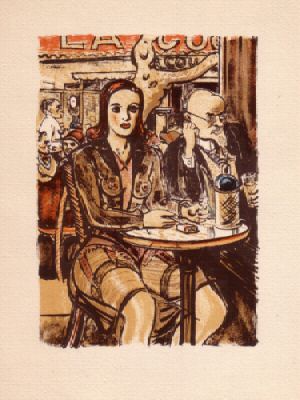Peace, and to be left alone.
I had occasion to watch the first few episodes of season 3 of Deadwood. I've watched all the preceding episodes in the DVD and I love the hell out of this show. And I've reached a startlingly obvious conclusion about the central dynamic of the show.
Seth Bullock, erstwhile lawman, statesman, and entrepreneur is at loggerheads with Al Swearengen, full throttle crime boss, murderer and whore monger. But through the end of season 2 they reach an accommodation that slowly morphs into an alliance against the encroaching government and Hearst concern. And why is that? (I asked myself) Why did these two enemies find friendship?
Because they each in their way are holders of the secret and devotees of the dream of the American West. They want to be left alone. Their morals might be polar opposites, but their ideology aligns. They want to be left alone.
That is the whole point of the American West. Solitude and self-preservation, the freedom to left to one's devices. Outside influences seek to control Deadwood the town, and pigeonhole Deadwoods people into the American model of commerce and government. A model that each person in Deadwood had actively sought to avoid in coming to that remote and lawless corner of the world.
It's an ethos that has dominated that part of the world--this part of the world, I guess--for centuries immemorial. Bracketing the 1870s in Deadwood, Dakota Territory, I have two pieces of historical information.
First, and most recent, I have my own family's history. My folks came to Colorado to get out of the Rust Belt. Jobs were drying up and neither wanted the life of secretary and an assembly line worker. And even those lives were few and far between in Detroit in 1975. So they came to Denver, where there wasn't much infrastructure, just work and potential for work. It's how they became business owners and parents: the opportunity presented by the American West.
Second I have the old ways that reigned over this continent before the coming of settlers and colonist and white men with their dead savior. "To us the ashes of our ancestors are sacred and their resting place in hallowed ground. You wander far from the graves of your ancestors and seemingly without regret. Your religion was written on tablets of stone by the iron fingers of your god so that you could not forget. Our religion is the traditions of our ancestors." That's Chief Seattle of the Suquamish and Duwamish--yes, they named the city after him, right after they killed all the injuns on the site. "We preferred our own way of living. We were no expense to the government. All we wanted was peace and to be left alone." That's Crazy Horse, warrior of the Oglala Lakota giving up the dying prayer of his people. But we white men would inherit that prayer and Seattle's pragmatism too.
The whole point of the West is to lose yourself and reinvent, better than before.
That harsh god that the white men brought over has no real sway here. That Sumerian sky god, with his demands of sacrifice and obedience is not the god of this land. That Great Spirit is. This is not the land of obedience and sacrifice, it's the land of being left alone. Maybe old Jehovah has his talons in the rocks of the east, but out West the Great Spirit still reigns.
And that's what made Bullock and Swearengen see eye to eye. Out here the only law is peace, and to be left alone.
Read more
Seth Bullock, erstwhile lawman, statesman, and entrepreneur is at loggerheads with Al Swearengen, full throttle crime boss, murderer and whore monger. But through the end of season 2 they reach an accommodation that slowly morphs into an alliance against the encroaching government and Hearst concern. And why is that? (I asked myself) Why did these two enemies find friendship?
Because they each in their way are holders of the secret and devotees of the dream of the American West. They want to be left alone. Their morals might be polar opposites, but their ideology aligns. They want to be left alone.
That is the whole point of the American West. Solitude and self-preservation, the freedom to left to one's devices. Outside influences seek to control Deadwood the town, and pigeonhole Deadwoods people into the American model of commerce and government. A model that each person in Deadwood had actively sought to avoid in coming to that remote and lawless corner of the world.
It's an ethos that has dominated that part of the world--this part of the world, I guess--for centuries immemorial. Bracketing the 1870s in Deadwood, Dakota Territory, I have two pieces of historical information.
First, and most recent, I have my own family's history. My folks came to Colorado to get out of the Rust Belt. Jobs were drying up and neither wanted the life of secretary and an assembly line worker. And even those lives were few and far between in Detroit in 1975. So they came to Denver, where there wasn't much infrastructure, just work and potential for work. It's how they became business owners and parents: the opportunity presented by the American West.
Second I have the old ways that reigned over this continent before the coming of settlers and colonist and white men with their dead savior. "To us the ashes of our ancestors are sacred and their resting place in hallowed ground. You wander far from the graves of your ancestors and seemingly without regret. Your religion was written on tablets of stone by the iron fingers of your god so that you could not forget. Our religion is the traditions of our ancestors." That's Chief Seattle of the Suquamish and Duwamish--yes, they named the city after him, right after they killed all the injuns on the site. "We preferred our own way of living. We were no expense to the government. All we wanted was peace and to be left alone." That's Crazy Horse, warrior of the Oglala Lakota giving up the dying prayer of his people. But we white men would inherit that prayer and Seattle's pragmatism too.
The whole point of the West is to lose yourself and reinvent, better than before.
That harsh god that the white men brought over has no real sway here. That Sumerian sky god, with his demands of sacrifice and obedience is not the god of this land. That Great Spirit is. This is not the land of obedience and sacrifice, it's the land of being left alone. Maybe old Jehovah has his talons in the rocks of the east, but out West the Great Spirit still reigns.
And that's what made Bullock and Swearengen see eye to eye. Out here the only law is peace, and to be left alone.
Read more





